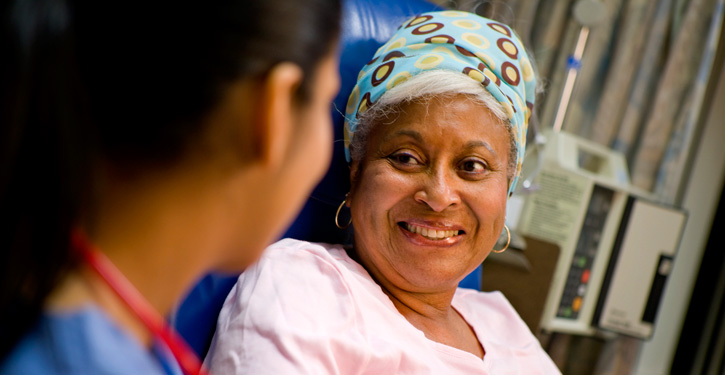Chemotherapy and Biological Therapies

Chemotherapy
Chemotherapy is a group of medicines used to treat cancer. While surgery and radiation therapy target specific areas of cancer, chemotherapy works throughout the body and can destroy cancer cells that have spread (metastasized) from the original tumor site.
How does chemotherapy work?
Chemotherapy destroys cancer cells. Some cancer cells grow slowly; others, rapidly. As a result, different types of chemotherapy drugs are designed to target the growth patterns of specific types of cancer cells. Each drug has a different way of working and is effective at a specific time in the life cycle of the targeted cells. Your doctor will develop a treatment plan specifically for you, based on your type of cancer, its stage of advancement, and your overall health. Depending on your individual condition, your chemotherapy may be designed to achieve one or more of the three goals: cure, remission, or controlling and/or relieving symptoms.
How is chemotherapy administered?
Your doctor will choose the method that will be most effective against your particular type of cancer and cause the fewest side effects. You may receive chemotherapy drugs in one or more of the following ways:
- Shot (injections)
- IV (intravenous or dripping medicine through a tube into the vein)
- Pill (oral medication)
What is the frequency of chemotherapy treatments?
How often you take chemotherapy depends on the type of cancer and which drug or combination of drugs you receive. Different drugs work at varying times in the cancer cell growth process. Your physicians will take all of these factors into consideration as they develop your treatment schedule. Chemotherapy is usually structured in cycles with rest periods between, and generally, treatments are given daily, weekly or monthly.
What are the possible side effects of chemotherapy?
Chemotherapy works by destroying cancer cells. Unfortunately, it does not exclusively target a cancer cell over a healthy cell. Therefore, it can cause side effects. Among the most common are nausea, vomiting, hair loss, fatigue and low blood counts. Some side effects may be temporary and merely annoying. Others, however, can be life-threatening. Be sure to tell you doctor of any side effects you experience. In most cases, your doctor can help you successfully manage side effects throughout your treatment cycles.
How do I know my chemotherapy is working?
Each person responds differently to treatment. Your doctor will closely monitor and measure your progress. Because some people experience side effects associated with their treatment and others have none, the presence or absence of side effects is not a reliable means of measuring the effectiveness of chemotherapy.
Biological Therapy
Biological and Immunotherapies involve the use of treatments that either interrupt vital processes that cancer cells need to survive and spread, or promote and support the body’s immune system response to cancer. Examples include monoclonal antibodies, interferons, angiogenesis inhibitors, and tumor vaccines.
Questions to ask about chemotherapy/Biotherapy:
- Why is chemotherapy/biotherapy the best option for me?
- What specific type of drugs/medicines are you recommending?
- What is the goal of this treatment?
- Can the treatment ease my symptoms?
- What side effects might I expect, and what can I do to manage them?
- How often will I receive treatment and how long will my treatments last?
- What restrictions (dietary, working, exercising) will I have during my treatment?
- When will I be able to return to my normal activities?
- What experiences have other patients had with similar chemotherapy/biotherapy regimens?
You will have the opportunity to ask questions during your one-on-one visit with a clinician who will review your individual chemotherapy treatment plan prior to your first chemotherapy infusion.
Cancer Treatment Classes
Our nurses and staff are here to provide you and your family with support during this time as you work together with your physician and health care team.
Our Certified Oncology Nurses hold regular Chemotherapy Classes during which common reactions and their remedies are discussed, as well as useful tips on diet, cosmetic and hygienic products, and lifestyle choices that can affect your treatment and its side effects. We strongly encourage you to attend one of these sessions, preferably before you receive treatment. The scheduling desk will gladly assist you with signing up for one of these educational sessions.

 Learn More
Learn More